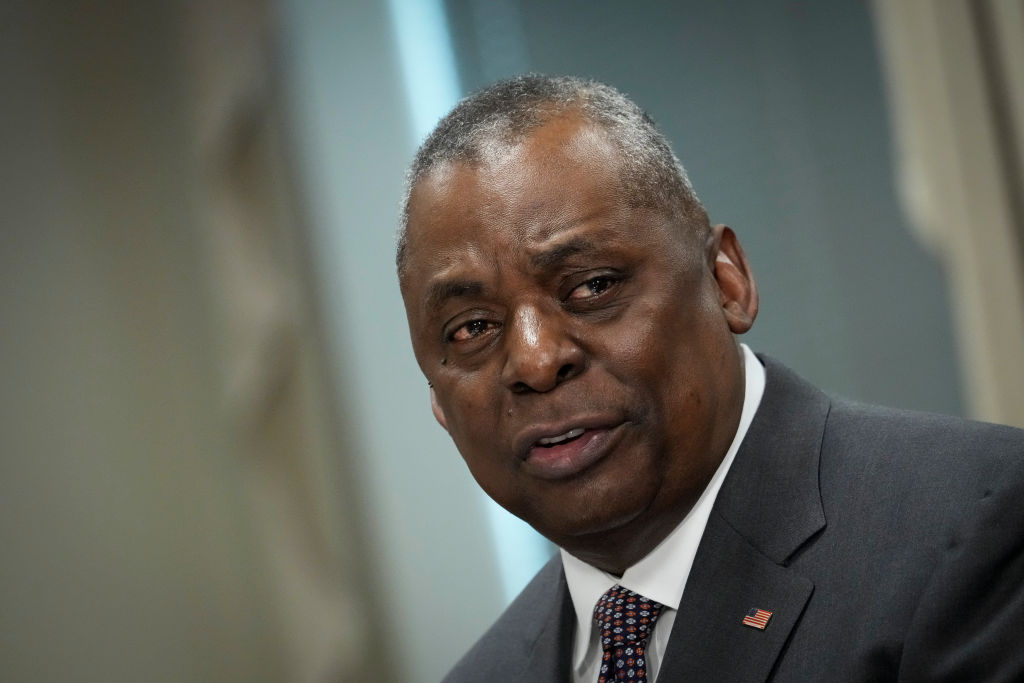
Aides to the US defense secretary and China’s defense minister are discussing a potential meeting in Singapore, according to people familiar with the preparations, a sign the Biden administration is more focused on keeping both sides talking rather than worrying that the two leaders are far apart in relative rank.
If negotiations are successful, Defense Secretary Lloyd Austin could meet Defense Minister Wei Fenghe on the sidelines of the Shangri-La Dialogue taking place June 10-12. While Austin spoke by phone with Wei in April, US officials had hoped he would be able to hold a call with General Xu Qiliang, vice chairman of the Communist Party’s powerful Central Military Commission.
That call hasn’t happened and, for now at least, isn’t likely to. But with US-China tensions peaking again over issues including Taiwan and human rights, both sides have a stake in dialing back some of the pressure.
“The administration appears to have decided that it is more important to communicate with Beijing and try to establish guardrails that can decrease the likelihood of conflict than to argue over the appropriate interlocutor,” said Zack Cooper, a senior fellow at the American Enterprise Institute and a former Pentagon official.
Austin and Wei share similar titles, but they are far from bureaucratic equals. Wei heads China’s defense ministry, a government organization in a political system where the Communist Party — not the government — controls the military.
Read More: The U.S. Is Losing a Strategic, Nuclear-Armed Ally to China
The position of defense minister in China “is mostly ceremonial with little real power,” said Timothy Heath, a senior international defense researcher at the RAND Corporation. “China’s defense minister was created to have a diplomatic counterpart to western defense ministers.” As vice chair of the Central Military Commission — a body overseen by President Xi Jinping — Xu is closer in actual rank to Austin, he added.
Working in favor of the meeting is the issue of precedent: Wei will be the most senior Chinese official at the Singapore event and met with former acting Secretary of Defense Patrick Shanahan at the 2019 Shangri-La Dialogue, the last time the gathering was convened in person before the Covid-19 pandemic.
Beyond Taiwan and human rights, the list of sore points between the US and China includes Beijing’s claims in the South China Sea and the ongoing war in Ukraine — where US officials are wary of any support Xi’s government might consider offering Moscow.
Biden and his top aides have repeatedly stressed the importance of creating “guardrails” on these issues and others to prevent competition between the world’s two largest economies from getting out of hand. And Secretary of State Antony Blinken, in a speech last week that took aim at Xi’s governance, said the US wants to ensure there isn’t a new Cold War with China.
Wei is set to discuss China’s “vision for regional order in the Asia-Pacific” at the Shangri-La Dialogue, according to a statement on Tuesday from the International Institute for Strategic Studies, which is hosting the event.
More Must-Reads from TIME
- Breaking Down the 2024 Election Calendar
- How Nayib Bukele’s ‘Iron Fist’ Has Transformed El Salvador
- What if Ultra-Processed Foods Aren’t as Bad as You Think?
- How Ukraine Beat Russia in the Battle of the Black Sea
- Long COVID Looks Different in Kids
- How Project 2025 Would Jeopardize Americans’ Health
- What a $129 Frying Pan Says About America’s Eating Habits
- The 32 Most Anticipated Books of Fall 2024
Contact us at letters@time.com